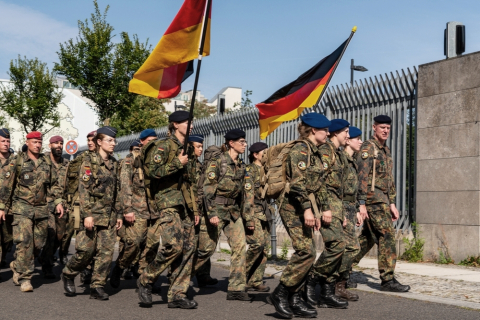Workshop on EU-Russian Relations
In collaboration with its partners, Ifri is currently supporting a Task Force on the future of EU-Russia relations. The first workshop was held on 2 December 2005 in Paris.
In collaboration with its partners, Ifri is currently supporting a Task Force on the future of EU-Russia relations. The first workshop was held on 2 December 2005 in Paris. Four contributions were then presented:
'Russia, NATO and the EU: A European Security Triangle or Shades of a New Entente?',
Andrew Monaghan, Russie.Nei.Visions, No 10(a), May 2006.
'The EU and Russia: the Needed Balance Between Geopolitics and Regionalism',
Thomas Gomart, Russie.Nei.Visions, No 10(b), May 2006.
'Representing Private Interests to Increase Trust in Russia-EU Relations',
Timofei Bordachev, Russie.Nei.Visions, No 10(c), May 2006.
'Multiplying Sources as the Best Strategy for EU-Russia Energy Relations',
Michael Thumann, Russie.Nei.Visions, No 10(d), May 2006.
They were debated by Xavier de Villepin, Louis Gautier, Dov Lynch, and Dominique David. The workshop was chaired by Thierry de Montbrial. This special issue of Russie.Nei.Visions gathers all these contributions in one place. At this stage, they must be read as works in progress, intended for critique and thus as fuel for the EU-Russia debate. They will be further enriched through the work of the second workshop, in 2006, and will end by issuing precise recommendations.
Related centers and programs
Discover our other research centers and programsFind out more
Discover all our analysesRussia, the Palestinians and Gaza: Adjustments after October 7th
The Soviet Union (USSR), and subsequently the Russian Federation as its internationally recognized legal successor, has consistently sought to play a visible role in efforts to resolve the Israeli-Palestinian conflict.
Deathonomics: The Social, Political, and Economic Costs of War in Russia
The report attempts to outline and examine a truly new phenomenon in Russian society, dubbed “deathonomics”—the making of a mercenary army against the backdrop of the Kremlin’s war in Ukraine, eventually replacing both the Soviet (conscript) and early new Russian (contract) armies. It notes that, by the end of 2023, this trend had turned the military service into one of the highest-paying professions in the country, something not seen in Russia on such a scale since the late 17th century.
Russia's Asia Strategy: Bolstering the Eagle's Eastern Wing
Among Russia’s strategic priorities, Asia traditionally played a secondary role compared to the West. In the mid-1990s, then Foreign Minister Yevgeny Primakov initiated a rapprochement with China and India. Then, in 2014, deteriorating relations between Russia and the West prompted Moscow to begin its “great pivot to the East”.
Kazakhstan After the Double Shock of 2022: Political, Economic and Military Consequences
The year 2022 represented a dual shock for Kazakhstan. In January, the country faced its most severe political crisis since independence, followed in February by Russia’s full-scale invasion of Ukraine, which cast uncertainty over the borders of post-Soviet states. These consecutive crises profoundly shaped Kazakhstan’s domestic and foreign policy.












